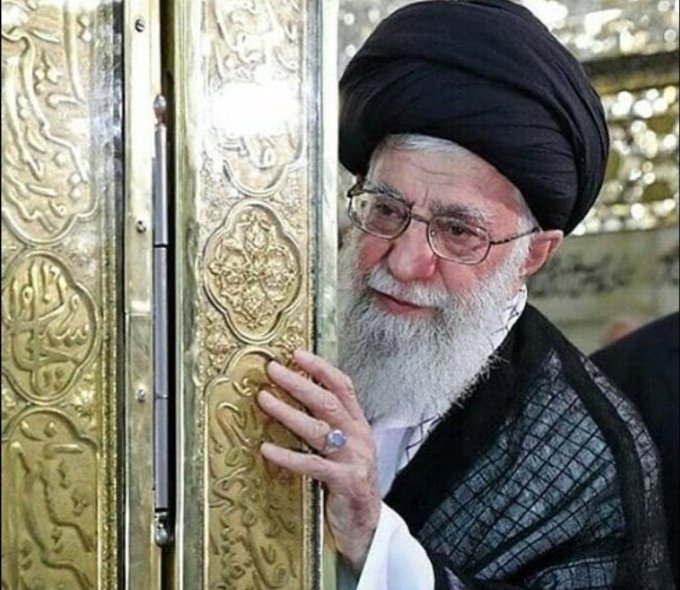Khamenei’s Confession
Nadim Koteich/Asharq Al Awsat/November 29/2022
اعترافات خامنئي
نديم قطيش/الشرق الأوسط/29 تشرين الثاني/2022
مشكوراً قدم المرشد الإيراني علي خامنئي اعترافه بطبيعة الدور الذي تلعبه بلاده في المنطقة العربية. ففي سلسلة تغريدات على حسابه العربي على منصة «تويتر»، قدم خامنئي تصوراً لمؤامرة غربية أحبطتها إيران، وفي تفاصيلها أن الغربيين يرون أن «العمق الاستراتيجي لإيران 6 بلدان، كان يجب أن تسيطر عليها أميركا والاستعمار، ثم يأتون إلى إيران، فكان لا بدّ من الإطاحة بحكومات هذه الدول الست (العراق، وسوريا، ولبنان، وليبيا، والسودان، والصومال)». ويضيف: «في الدول الثلاث (العراق، وسوريا، ولبنان) نجحت سياسة إيران وأخفقت أميركا. إنّ نتيجة دخول إيران هي هزيمة أميركا في هذه البلدان الثلاثة».
يُبطل مثل هذا الاعتراف كل مساعي تبرئة إيران من التدخل في شؤون لبنان وسوريا والعراق، وغيرها من الدول (الساحات، حسب التعبير الإيراني)، وينفي مزاعم قادة الميليشيات التابعة لإيران والعاملة في هذه الدول، أن إيران تدعم تطلعات الشعوب، لا أجندتها الخاصة.
بيد أن المثير في كلام خامنئي أمران: أولاً أنه يقيم تناقضاً صارخاً بين تبني نجاح الاستراتيجية الإيرانية علناً، وبين التبرؤ الدائم من كل الأفعال التي يفترض أنها أفضت إلى هذا النجاح؛ لا سيما حين تكون هذه الأفعال ذات طابع إجرامي. وثانياً أنه لا يتوقف ولو لهُنيهة عند الأثمان المهولة للنجاح المفترض لاستراتيجية بلاده، والتي دفعتها شعوب لبنان وسوريا والعراق.
فلو أخذنا لبنان مثلاً؛ حيث حكمت محكمة خاصة على عدد من المتهمين بجريمة اغتيال الرئيس رفيق الحريري، ممن هم أعضاء في خلايا النخاع الشوكي لميليشيا «حزب الله»، جاز لنا أن نسأل إن كان اعتراف خامنئي هو اعتراف غير مباشر بقتل الحريري أيضاً.
فبحسب منطق خامنئي، ما كان الحريري إلا تعبيراً سياسياً من تعبيرات الاستعمار ومشروعه، وأداة ضمن عدة الشغل الغربية التي تفضي في النهاية إلى خدمة المشروع الاستعماري الغربي ممثلاً بـ«الكيان الصهيوني». ولئن قتل الحريري، ثم انتصر المشروع الإيراني -حسب خامنئي- بات من غير المفتعل القول إن مقتل الرجل كان المقدمة الضرورية للانتصار، ويصب بالتالي رصيد شطبه في رصيد خامنئي وإيران.
أما لو نظرنا إلى الأحوال العامة في لبنان، والعراق، وسوريا، فسيتيسر لنا استنتاج أن ما حل باللبنانيين والسوريين والعراقيين (والإيرانيين بالتأكيد)، أثمان زهيدة لا بد منها بغية تدبير الانتصار على مؤامرة الغربيين، أكانت هذه الأثمان هدم الدولة اللبنانية، أو سحق النسيج الاجتماعي السوري، أو نهب وتفتيت العراق، وإلحاقه بمنظومة حكم المافيا والميليشيا.
بيد أن هذا الطرح التبسيطي على لسان خامنئي لطبيعة الدور الإيراني، كدور مناوئ لمؤامرة الغربيين، ثم الاستنتاج المتسرع بالانتصار، يحتاج هو أيضاً للوقوف عنده.
فلا يخبرنا خامنئي لماذا لم تشمل هزيمة المؤامرة الغربية، إنهاء إسرائيل، بوصفها درة تاج المؤامرة، حسب الفهم الإيراني للعالم. وكيف يحصل أن تكون أحوال إسرائيل الاقتصادية والمالية والعلمية والعسكرية على هذا النحو من التقدم الصاروخي، في مقابل الأحوال المزرية للمنتصرين عليها! ولا يخبرنا كيف يُحسب ضمن ديناميات مواجهة المؤامرة، التحالف والتآزر مع الأميركيين في العراق، والتنسيق معهم لإسقاط صدام حسين، ثم ترتيب تكوين وتقاسم السلطات فيه، حتى يومنا هذا.
كل هذا مما لا يدخل في حسابات منطق علي خامنئي هذه الأيام. فمنطق الآيديولوجيا المأزومة لا يتوقف كثيراً عند دقة الأدلة، أو ما تفصح عنه الأرقام والمعادلات الحسابية الصارمة. منطق علي خامنئي هو منطق المأزوم والموجوع في آن.
لم تأتِ تغريدات خامنئي من فراغ. فهي امتداد لعدد من السلوكيات التي تصدر عن جهة سياسية يائسة في مواجهة أخطر انتفاضة داخلية تواجهها، حتى ولو قُيض لليد الحديدية أن تقمع الحراك الشعبي. فإيران فكرة قبل أن تكون أي شيء آخر، وهذه الفكرة تُسحل في شوارع المدن والبلدات الإيرانية. الباقي من الفكرة هو القدرة على البطش، وإرغام الناس على تجرعها بالعنف العاري والصلف، واستدعاء الهيبة بالبلطجة في وجه العالم.
من تهديدات «الحرس الثوري» للسعودية، إلى العدوان على سفينة تجارية في بحر عمان، إلى رفع مستوى تخصيب اليورانيوم في إيران، إلى زيادة الدعم العسكري لروسيا في أوكرانيا بالمُسيَّرات والصواريخ، إلى الأنباء عن نشر إيران منظومة صواريخ أرض جو، تهدد خطوط الملاحة الجوية في شرق آسيا، وغيرها الكثير الكثير من تعبيرات الاستنفار، تصب جميعاً عند حقيقة بسيطة يرفض النظام الإيراني الاعتراف بها، وهي أن كل الانتصارات في الخارج، الوهمية والفعلية، لا تغطي على هزيمة الفكرة الإيرانية في الداخل.
يمكن لخامنئي عبر ميليشياته أن يفرض رئيساً في لبنان، أو أن يطيح معادلة عراقية سياسية يقلقه ارتفاع منسوب العروبة فيها، كتلك التي شكَّلها رئيس الوزراء السابق مصطفى الكاظمي، ويمكنه أن يفتح باب الابتزاز للدول الخليجية في المياه الدولية، كما على تراب اليمن، أو أن يهدد أمن أهداف مدنية إسرائيلية.
كل هذا ممكن بمنطق القوة والقمع. ما لا يمكنه فعله هو أن يعيد إلى فكرة الجمهورية الإسلامية في إيران ذرة احترام واحدة فقدتها، في صرخة امرأة تدافع عن شعرها.
Khamenei’s Confession
Nadim Koteich/Asharq Al Awsat/November 29/2022
We should be grateful to Iranian Supreme Leader Ali Khamenei for admitting to the role that his country plays in the Arab world.
In a series of tweets from his English account, Khamenei put forward his vision of a Western conspiracy that Iran had foiled. “From the Westerners’ point of view, Iran had strategic depth in six countries. They had to be controlled by the United States and the colonialism before Iran could be dealt with. The governments of these six countries (Iraq, Syria, Lebanon, Libya, Sudan and Somalia) had to fall,” he says. He then adds that “Iran’s approach was successful in Iraq, Syria and Lebanon, and the US policy failed.”
Such confessions invalidate all the attempts to maintain that Iran is innocent of interfering in the affairs of Lebanon, Syria, and Iraq, as well as other countries (arenas, per the Iranian lexicon.) It also denies the claims made by the leaders of the militias loyal to Iran operating in these countries, who always maintain that Iran supports the aspirations of the people, not its own agenda.
Two things seem interesting about what Khamenei said. First, it entails a flagrant contradiction between explicitly endorsing Iran’s strategic successes and his consistent claims that Iran is innocent of the actions that supposedly led to this success, especially when they are of a criminal nature. Second, it does not even mention the staggering costs for his country’s supposed strategic success, which were paid by Lebanon, Syria and Iraq.
Let us take Lebanon as an example. The Special Tribunal for Lebanon ruled that several of those accused – key Hezbollah operatives – of assassinating Rafik Hariri, and it is valid to ask whether Khamenei’s confession is also indirectly a confession that his regime killed Hariri.
Per Khamenei’s logic, Hariri was nothing more than the political manifestation of colonialism and its project – a tool in the toolkit the colonialist West uses to further its agenda, which is represented by the “Zionist entity.” Since the Iranian project was victorious – according to Khamenei – after Hariri was killed, it becomes easy to maintain that the man’s assassination was a necessary prerequisite for this victory.
If, on the other hand, we were to examine the state of affairs in Lebanon, Iraq and Syria, we would conclude the conditions of the Lebanese, Syrians, Iraqis and (of course) the Iranians are the high cost that had to be paid to ensure victory over the Western conspiracy. These costs include destroying the Lebanese state, obliterating the Syrian social fabric and breaking Iraq apart.
It seems that the simplified explanation put forward by Khamenei regarding the role played by Iran, which he presented as one of creating a bulwark against Western conspiracies and followed up with his premature conclusion that victory had been attained, also requires our attention.
Khamenei does not tell us why defeating the Western conspiracy did not end Israel, the crown jewel of the conspiracy according to the Iranians’ worldview. Nor does he explain how Israel has managed to achieve such immense progress on the economic, financial, scientific and military fronts while those who defeated it find themselves in dire straits!
He does not tell us how allying and coordinating with the Americans in Iraq feeds into the dynamic of confronting Western conspiracies. They coordinated together to bring down Saddam Hussein and then to establish and power share there, which they continue to do to this day.
None of this is factored into Khamenei’s logic. Ideological thinking in crisis does not look into the veracity of the evidence or what numbers and cold calculation can tell us. Khamenei’s logic is that of someone both in crisis and pain.
Khamenei did not make his tweet in a vacuum. They are an extension of the hapless policy he has adopted to confront the threats posed by the revolt his regime is facing, which will fail even if the regime’s iron fist manages to repress the popular uprising.
Indeed, Iran is an idea before anything else. And this idea is being dragged across the streets of Iran’s cities and towns. All that remains of the idea is its ability to use brutality, force people to accept it through raw violence, and call on thugs to face the people.
From the Iranian Revolutionary Guards’ threats to Saudi Arabia to attacking a commercial ship in the Gulf of Oman, raising uranium enrichment in Iran, increasing military support for Russia in Ukraine through supplies of drones and missiles, to reportedly deploying a surface-to-air missile system that threatens air navigation in East Asia, and many other provocative actions, all boil down to a simple fact that the Iranian regime refuses to acknowledge. All its foreign victories, fabricated and genuine, cannot paper over the domestic defeat of the Iranian idea.
Khamenei can impose a president on Lebanon through his militia. He can do away with a framework that worries him in Iraq because it implies a greater degree of commitment to Arabism, like that of Mustafa al-Kadhimi’s government. He can also blackmail the countries of the Arab Gulf by threatening their waters and attacks from Yemen, as well as threaten the security of Israeli cities.
All of that is possible with the logic of strength and repression. What it cannot do is give the idea of the Islamic Republic back an iota of the respect it has lost to the cries of women defending their hair.





















